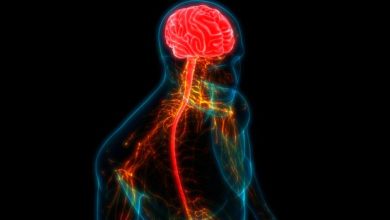Waking Up with Numb or Tingling Hands: What It Really Means (Science Based)
Waking up with numb or tingling hands in the morning is a common experience for many people. In most cases, sleeping on one hand can press on nerves in your hand, causing a sensation of “pins and needles.” In some cases, you may even find that your hands are completely numb after sleeping. Usually, when you change position, sensation quickly returns to your hands and the tingling disappears.
If you frequently have numb or tingling fingers or stiff hands in the morning, there could be another underlying cause. Nerve damage, carpal tunnel syndrome, autoimmune conditions, or diabetes can cause chronic numbness in the hands. This can mean that you don’t just wake up with tingling hands, but the prickly sensation may continue throughout the day.
In this article, you will find the reasons why you could be waking up with numb and tingling hands in the morning. In some cases, you will find some helpful tips on what to do if your hand falls asleep at night.
Why Do My Hands Feel Tingly and Numb When I Wake Up?
Researchers from the National Institutes of Health say that the medical name for a tingling sensation in the limbs is paresthesia. The prickly sensation in your hands usually happens when there is sustained pressure on the nerves in your arms and hands. For example, falling asleep with your head on your arm will cause you to wake up with pins and needles in your arm and hand.2
It seems that our arms or hands are especially susceptible to developing “pins and needles” sensations during the night.
Professor of Plastic Surgery, Dr. Brandon J. Wilhelmi, says that the hands contain a complex array of nerves, ligaments, and blood vessels. The 3 main nerves in the hand that provide sensation are the median, radial, and ulnar. You may wake up with numb arms, numb hands or tingling hands if any of these nerves is compressed, damaged, or irritated.1
Waking Up with Numb Fingers, Hands or Arms: Related Symptoms
If you wake up in the morning with tingling or numb hands because of falling asleep on your arm, “pins and needles” is probably the only symptom you may have.
However, if there is another underlying cause of your hands being asleep in the morning, you may experience any of the following symptoms:
- Feeling like you have electric shocks in your fingers
- Tingling sensation that travels the length of your arm to your shoulder
- Weakness and difficulty gripping objects tightly
- Inflammation in your finger joints or wrist
- Tingling or numbness in both your hands and feet
- Numbness on the back of your hand
- Burning pain when feeling returns to your hands
Reasons for Waking Up with Numb or Tingling Hands
Let’s look in more detail at some of the most common reasons why you feel your hands tingle or are numb in the morning.
Sleeping in the wrong position
Sleeping in a position that puts pressure on your hands during the night is a common reason for waking up with tingling hands. Depending on how long the pressure has been on the nerve, you can wake up with a feeling as if your whole arm has fallen asleep.
The journal Plastic and Reconstructive Surgery published a study showing that hand tingling and numbness in the morning is associated with the sleeping position. Researchers discovered that sleeping on your side in a lateral sleep position reduced instances of hand paresthesia in the morning.3
Some poor sleeping positions that can result in waking up with numb hands include:
- Sleeping with your head on a crooked arm
- Falling asleep on your back with one or both arms outstretched above your head
- Sleeping with an arm under your body
Some of these sleeping positions can also result in waking up with a sore shoulder.
Saturday night palsy
Another sleep-related reason for waking up with the feeling as if your whole arm has been paralyzed during the night is “Saturday night palsy.”
The journal Neurosurgery reports that the term “Saturday night palsy” is coined from people falling asleep drunk against a firm object. The alcohol intoxication usually prevents a person from waking up despite the arm or hand pain. The result is usually that the person wakes up with numbness in one hand in the morning and a thumping headache.4
Frequently drinking too much alcohol is also associated with alcoholic neuropathy which is characterized by tingling in both hands and feet. Dr. Carol DerSarkissian on WebMD says that alcoholism can damage nerve endings or cause vitamin deficiencies that result in hand paresthesia.5
Carpal tunnel syndrome
A common reason for pain and numbness in your arms and hands while sleeping is carpal tunnel syndrome. Continual pressure on the median nerve in your wrist will cause your palms to tingle in the morning.
According to research published in the journal Neurologia Medico-Chirurgica, the first sign of carpal tunnel syndrome is waking up with tingling hands. This may be accompanied with the hand feeling stiff in the morning. As carpal tunnel syndrome progresses, a person will experience hand tingling both during sleep and throughout the whole day.6
Neurologist Dr. Friedhelm Sandbrink says that carpal tunnel syndrome can also make the hands so painful during the night that it wakes a person from sleep.17
Many people with carpal tunnel syndrome say that their fingers feel like sausages even though no hand swelling is visible.6
Many doctors recommend gently shaking your hands and fingers in the morning to help restore proper feeling to your hand. For other ways to relieve carpal tunnel syndrome symptoms, please see my article on how to relieve forearm pain.
Ulnar nerve compression
Compression on the ulnar nerve in your hand can be a reason why your fingers tingle when you wake up.
The Journal of Chiropractic Medicine reports that tingling in the pinky and ring fingers becomes worse during the night. A person with ulnar nerve compression may also feel weakness in their arm along with burning pain. Researchers also mentioned that poor posture during the day can aggravate entrapped nerve symptoms at nighttime.7
Doctors from the American Academy of Orthopedic Surgeons report that numbness and tingling in the little finger and ring finger often occur when sleeping with a bent elbow.8
If you frequently wake up with tingling fingers in the morning, try bracing your arm so that you don’t bend it while you are sleeping.
Vitamin deficiencies
Various vitamin and nutrition deficiencies can be a reason for hand tingling or numbness in the morning. Nerve damage can sometimes occur if your body can’t absorb certain vitamins and minerals.
The journal Neurologic Clinics describes a condition called nutritional neuropathies. Research has found that lack of a healthy diet, gastrointestinal conditions, or pregnancy can all affect the nervous system. Among the vitamin deficiencies that could be responsible for tingling fingers in the morning are:9
- Vitamin B12. Doctors say that a vitamin B12 deficiency can result in nerve damage that causes a person to have numb hands and fingers that tingle.10
- Vitamin B6. A vitamin B6 deficiency can start off as numbness and tingling in the feet that eventually spread to the hands. Eventually, a burning pain develops in the limbs. Some research points to the fact that a lack of vitamin B6 can cause carpal tunnel syndrome.11
- Vitamin E. Your body needs enough vitamin E to help keep nerves functioning healthily.
Other Reasons for Tingling or Numb Hands When Waking Up in the Morning
Pressed nerves in your shoulder, arms, or hands are the most common causes of your hand falling asleep at night. However, there are some underlying health conditions that can make you wake up with tingling, itching, or numbness in your hands.
Diabetes and numb fingers in the morning
Diabetes can affect the nerves in your hand and cause you to awaken from your sleep every morning with numb or tingling hands. Research carried out by the American Academy of Neurology found out that one of the signs of diabetes is weakness, numbness or tingling sensation in hands or feet. This condition is called diabetic neuropathy and it’s a result of damage to your peripheral nerves.
Doctors say that diabetes tends to cause tingling and itching in the upper limbs more than the lower limbs. Diabetics can also suffer from pain in their arms and muscle weakness. Very often, symptoms of tingling arms are more pronounced in the morning.12
Diabetic neuropathy is also one of the causes of itchy arm or palm.
Stroke
Persistent tingling or numbness in your hands could be a complication of a stroke due to nerve damage in your left arm or right arm.
Doctors from the Mayo Clinic report that uncomfortable chronic tingling sensation in the affected arm or hand is a common stroke complication. In some cases, stroke sufferers find that they lose all feelings of sensation in one of their arms.13
In some cases, waking up in the middle of the night with a paralyzed arm could be a sign of impending stroke. The journal The Neurohospitalist reports that a “wake-up” stroke is when a person goes to sleep and wakes up with stroke symptoms.14
- Paralysis or numbness affecting your arm, leg, face on one side of your body.
- Slurred speech
- Vision problems
- A severe headache
The Mayo Clinic reports that many strokes can be prevented by making healthy lifestyle choices. Taking steps to lower your blood pressure, losing weight, and controlling diabetes can help to lower your risk of having a stroke.
Multiple sclerosis
Waking up with numb hands on most mornings is sometimes associated with multiple sclerosis (MS).
Doctors from the Mayo Clinic say that multiple sclerosis occurs when the body’s immune system attacks nerve fibers that cause the nerves to degenerate. Numbness or tingling in your hands and other parts of your body is common. Sometimes the pain can be so sudden and severe that it feels like an electric shock.15
Other reasons for tingling hands in the morning
According to doctors from the National Health Service, other reasons why you may wake up with pins & needles in the morning can include:
- Raynaud’s disease. An autoimmune condition that is characterized by white tips of your fingers and a tingling sensation in your palms and fingertips.
- Medication. Tingling hands in the morning or during the day is sometimes a side effect of antibiotics and anti-seizure drugs.
- Nerve damage. Apart from pressed nerves in your upper arm causing your hands to tingle at different times of the day, an injury can damage nerves and cause acute or chronic hand tingling.
- Toxic substances. Heavy metals like lead, mercury, and certain chemotherapy drugs can cause your hands to feel tingly and numb.
- Infections. For example, Lyme disease can cause a painful sensation of pins and needles in the hands and feet. These symptoms can appear years after the initial infection.16
What to Do If You Wake Up with Pins and Needles in Your Hands
If you have tingling or numb hands in the morning, there are a few steps you can take to restore feeling to your digits, palms, and hands. For example, Dr. Friedhelm Sandbrink says that many people find that shaking their hands first thing in the morning can help to relieve tingling that is caused by nerve issues.17
How to “wake up” an arm that has fallen asleep:
- Free your arm from whatever was pressing on it.
- Gently flick or shake your hands for 5 seconds to help improve circulation to your hands.
- Stretch your arms in front of you and slowly bring them both up above your head to try and touch the ceiling. Hold for 5 seconds.
- Loosen the nerves in your neck by gently moving your head from side to side as if you are trying to touch your shoulders with your ears.
- Roll your shoulders up and down and back and forward to help release tension in the nerves in your shoulder blade.
- Repeat every morning to help relieve the sensation of having numb or tingling hands in the morning.
How to Prevent Waking Up with Numb or Tingling Hands
If you find that you wake most mornings with tingling fingers or palms, you may need to take some preventative measures to stop the hand pain.
Here is what you can do to help avoid numb or tingling hands in the morning:
- Change your sleeping position. Try to avoid sleeping on your arm or hand and don’t let it dangle out the bed during the night. Sleep on your side rather than on your back and change sides to avoid too much pressure on one hand.
- Exercise regularly. Regular exercise will help improve your circulation and also help you get a better night’s sleep.
- Good posture. Try to adopt good posture techniques throughout the day to prevent muscle and nerve strain in your shoulder in the evening time.
- Take regular breaks. If you do repetitive jobs with your hands like typing, sewing, or knitting take breaks regularly. Stretch your hands and fingers and rotate your wrists.
- Address any vitamin deficiencies. Make sure you are eating a healthy, well-balanced diet to ensure you get enough vitamins and minerals.
When to See a Doctor
Thankfully, occasionally waking up in the morning and not being able to feel your hand is usually due to your sleeping position. However, frequently awakening from sleep with tingling, numbness, or “pins & needles” in your hand could be a sign of an underlying health condition.
Doctors from the Mayo Clinic advise seeing a doctor for numbness and tingling in the hands that are accompanied by the following symptoms:
- The tingling starts gradually and becomes more persistent, for example, waking up every morning with “pins and needles” in your hands.
- The numb sensation spreads to other parts of your body.
- The tingling is constant and started after a traumatic injury.
- You only feel numbness in just one or two fingers.
- The tingling sensation in your hands seems related to repetitive tasks.











